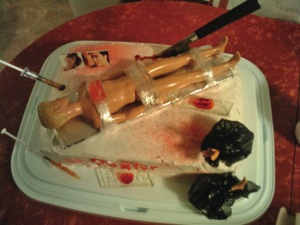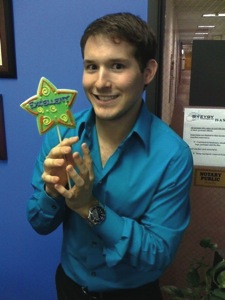
Someone called my column saccharin the other day – one of the more (ironically) bittersweet critical compliments I’ve received. It’s the aspect I love and hate most in my writing, and one I can’t seem to change.
It’s frustrating because I have so many dark and depressing thoughts in my head, but I can never seem to unburden myself through writing. My evil side just doesn’t survive the editing process anymore and I can’t figure out if that’s because I’m just that good or because I’m just that good at hiding the bad.
I know I won’t find any definite answers, but I can’t help obsessing over my moral identity. I blame this on American culture and our fascination with individualism, personality, self-reflection, self-expression, the study of psychology and self-diagnosis. It’s like I have Freud constantly knocking on my door asking if I’m really sugar-sweet or just some sexual deviant wearing a Joker mask telling readers to a put a smile on their face. I wish he’d go away.
As if that weren’t enough, I suffer from my generation’s fear of being ordinary. We each generically fear being generic; it’s an obnoxious paradox. Unfortunately, my recognition of this mindset doesn’t do much to help me avoid my more ridiculous aspirations of individualistic grandeur.
Sometimes it makes me wish I could just drop the sweetness. A detailed explanation of my latest gangbang or trashy drug night would make for a far more interesting read.
Being maniacally evil would be a more attention-grabbing path for me, I often think. After all, with just a small loss of conscience, I would make for an exceptionally compelling psychopath. I have many of the qualifications required for antisocial personality disorder and would revel in the rarity of the condition.
Unfortunately, effective crime is time consuming and my parents are disgustingly good people that have a way with parenting. So until I work out my inner angst, I’m stuck finding sweet relief in the little indulgences like Dexter and my many games.

Thankfully, in the world of fantasy, jumping between good and evil is as simple as playing a different character. The other day my game tester friends invited me over for some Mafia, a classic live-action role-playing game better known to those who have taken drama classes or attend geeky board game parties. I found the game to be a delectable feast for social and self-study.
The roles of killers, doctors, sheriffs and villagers are assigned randomly, and the game unfolds in a series of murderous rounds that pit friends against one another in a race to discover each other’s true identities. Lies, accusations, pleas of innocence and murder all play into the social experiment, and reveal the disturbing truth about how far people are willing to go to win. Perfect I thought, an opportunity to test my capacity for both good and bad.
During the first game, I was selected to be a regular villager and my goal was to identify the killers in the room. I didn’t know who was lying and who to trust. I looked around and tried to read my friends, but their warm smiles said nothing. All I could do was act as myself, overanalyzing every move and attempting to convince everyone of my own innocence.
But I was too loud and trying too hard, they said; I could not be trusted. So they lynched me and forced me to watch the game unfold from the grave, completely bound from sharing the truth – they had killed an innocent man.
I realized then and there how little I knew my friends and how little they knew me. We spend at least eight hours a day together at work, and yet I have little sense of who they are and how well each of them tells lies.
The game turned out to be far more complicated than I expected, and perfectly demonstrated the facts of real relationships and life. Masks and deceit come so easily to some and it takes a great deal of intimacy to understand people and their motivations.
Well if I can’t figure myself out, hopefully they can’t either. I smiled devilishly as I was selected to be a killer in a subsequent game. Moment of truth, I thought, can I let the devil out?

As it turns out, I’m a terrible liar. I was instantly suspected, accused of murder and cornered by the townspeople. An experienced player might have been able to talk his way out of my position, but I caved almost immediately. The whole time, I screamed in my head, “Why aren’t you lying to them?”
They killed me, of course, but I wasn’t upset. I had lost the game, but felt like I had won something else.
I can’t hide the bad, I realized. Even with a good reason to lie, all I could do was laugh and come clean. Sometime between accomplishing my goals and developing a sense of certainty about myself, I’ve become a compulsively honest man. Something about knowing who you are changes the way you interact with others. Your walls and defenses break down because you feel safe to share.
At least this means I can’t be saccharin. I might be a groan inducing boy next door, but I’m made of real f*cking sugar.











